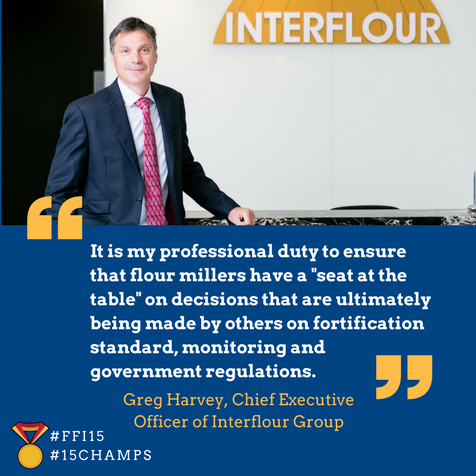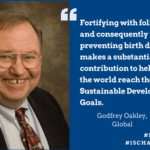Chief Executive Officer of Interflour Group based in Singapore

FFI: How did you become interested in nutrition?
Harvey: One very rewarding aspect of a rewarding 27-year career in agribusiness is the strong feeling and awareness that you are contributing, in a small way, to feeding the world and making it a better place. That may sound “clicheé,” however I really believe that all around the world, agribusiness participants – from farmers to food manufactures – have that ethos.
FFI: What inspired you to become involved with food fortification?
Harvey: I first heard Glen Maberly at an FFI meeting in Asia back in about 2005 or 2006. He talked about the science and benefits of fortifying flour and the public health impact, and that gave me awareness. Then my friend and colleague, Philip Purnama (Bogasari Vice-President at the time) asked me to attend a FFI leaders meeting from which I was invited to be a member of the Executive Management Team. The inspiration and reason for me to become so actively involved was the tangibility of making a contribution to society in even a small way. Also, the fact that the product of your business can be such a vital vehicle to help address neural tube defects (NTDs) and alleviate micronutrient deficiencies across the world was a compelling reason to be involved. The other key reason for my involvement was that the role of the flour miller is vital to the fortification process and I feel it is my professional duty to ensure that flour millers have a “seat at the table” on decisions that are ultimately being made by others on fortification standards, monitoring and government regulations. If policy makers make decisions that adversely impact on flour millers and restrict their support and willingness to fortify flours, then FFI’s goals will be impossible to achieve.
FFI: What are the greatest challenges you have encountered?
Harvey: First, there is still ignorance by policy makers and industry players on the burden of micro-nutrient deficiencies and NTDs – and how they can be addressed by such the cost-effective and simple means of food fortification. Our communication strategies and implementations have been a big success factor on raising awareness and removing ignorance. Also putting “boots on the ground” in our focus regions, backed by well-developed business plans, has let us target and allocate resources appropriately with success.
Second, the challenge of time is immense. Advocating and achieving policy decisions in individual countries move at a glacial pace – at least it seems like that to me – a business professional who moves with quick decisions in a competitive market. Some countries take 10 years to create fortification policies that are reasonable and achievable. The challenge is how to keep momentum and enthusiasm during such long periods. At FFI, our way to overcome this is continual review of progress and discussion on how tactically all of our partners resources and commitments can be used. We meet the challenge through painstaking attention to details, follow-through and patience.
The third key challenge is the ongoing funding constraint of FFI. We have a modest budget of US$ 2 million, with great in-kind support from many of our partners. This is not enough to do the programs that we would like to do, or to allocate regional resources. We meet this challenge through prudent financial management and budget control – along with ongoing fund raising.. I am very pleased that during the last six years FFI has become financially secure. We just need to keep raising awareness and funding support.


